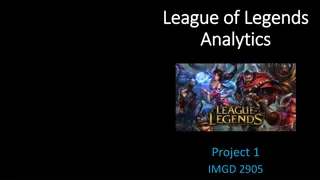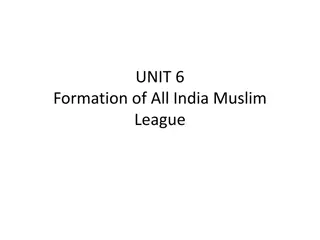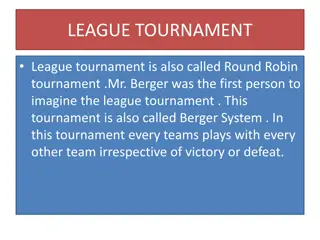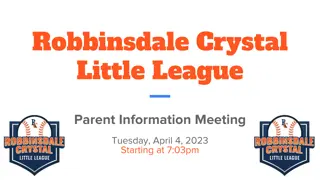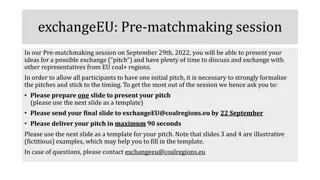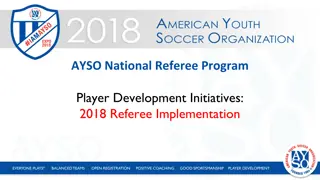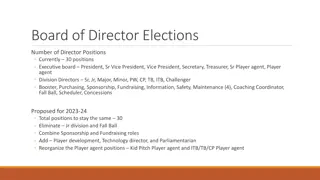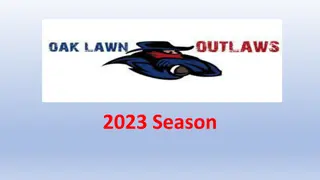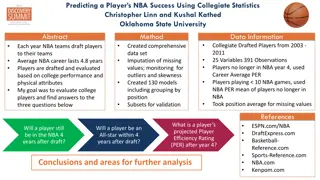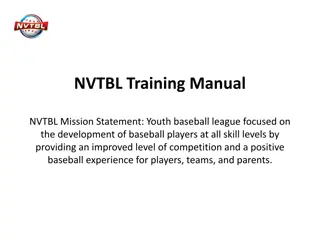Exploring Matchmaking in League of Legends: A Study on Player Balance and Enjoyment
This study dives into the realm of matchmaking in League of Legends, focusing on player balance and enjoyment. The research delves into the importance of balanced games for player engagement, leveraging a controlled environment to gather both objective and subjective data. Insights from the study shed light on player perceptions of game balance and enjoyment, highlighting factors that contribute to a satisfying gaming experience.
Download Presentation

Please find below an Image/Link to download the presentation.
The content on the website is provided AS IS for your information and personal use only. It may not be sold, licensed, or shared on other websites without obtaining consent from the author. Download presentation by click this link. If you encounter any issues during the download, it is possible that the publisher has removed the file from their server.
E N D
Presentation Transcript
Surrender at 20? Matchmaking in League of Legends Mark Claypool, Jonathan Decelle, Gabriel Hall, and Lindsay O'Donnell claypool@cs.wpi.edu Computer Science and Interactive Media & Game Development Worcester Polytechnic Institute 1
Introduction Online games typically coop or player-versus-player Critical to have games balanced for fun Matchmaking process of grouping players of similar skill Improve? Some published work [1,2] but lacking 1. Matchmaking in practice 2. Matchmaking correlated with player opinion Fun Sweet spot Too hard! Just right! Too easy! Game Balance 2
Matchmaking in League of Legends This paper matchmaking in League of Legends (LoL) League of Legends(Riot Games 2009) Played by more than 27 million people each day [3] Professional leagues Players ranked, teams of 5 players, team vs. team If really imbalanced game? Can surrender 20 minutes in User study Play LoL in controlled environment Record objective data (e.g., player rank and game stats) Provide survey for subjective data (e.g., match balance and enjoyment) 3
Teasers Objective Teams are balanced 50% players within 1 rank of each other Games are balanced 80% teams within 1 average rank of each other Subjective Games are not balanced When players win, perceive slight imbalance When players lose, perceive large imbalance Players enjoy winning more than losing (no surprise) (Surprise!) Players most enjoy matches imbalanced in their favor! 4
Outline Introduction Methodology Results Conclusion (done) 5
Methodology Computer lab with 9 computers Windows 7 LoL version 4.21 Intel i7-3770 3.4 GHz, 12 GB DDR3 RAM, AMD Radeon graphics, 24 Dell monitors, Headsets 1. Players provide demographic information 2. Play game (solo queue) 2. (We gather objective data from OP GG https://na.op.gg/ ) 3. Players provide subjective opinions 6
Outline Introduction Methodology Results Demographics Objective balance Subjective balance Enjoyment Conclusion (done) (done) (next) 7
Demographics 52 complete responses 23 unique users 70% white, mostly 18-22 years, mostly males Most played LoL 80% once a week 50% once a day 60% played solo Our study slightly more uniform distribution of rank than LoL population 8
Objective Team Imbalance Goal: Players of similar skill on each team Result: Most teams are balanced But about 10% more than 3 from mean 9
Objective Game Imbalance Goal: Teams of similar rank versus each other Result: Most games evenly matched But about 5% difference of 2 from mean 10
Subjective Game Imbalance (1 of 3) How even did you feel the game was? Little correlation in subjective imbalance and objective imbalance Equalizing team ranks alone not sufficient 11
Subjective Game Imbalance (2 of 3) Players generally felt imbalance in other teams favor 12
Subjective Game Imbalance (3 of 3) Win? Game is balanced Lose? Game is imbalanced 13
Subjective Game Enjoyment How enjoyable was the game you played? Win? Game is fun (70%), never not fun Lose? Game is almost never fun (90%) 14
Enjoyment versus Balance Fun Sweet spot Game Balance Sweet spot? Fun Game Balance Imbalance in player s favor the most fun! 15
Conclusion Matchmaking critical for making teams, making matches But little published work on matchmaking systems and player opinions on them This paper study of matchmaking for League of Legends Objective (rank) and Subjective (balance and fun) Results: Objectively teams and games are balanced Subjectively games only balanced for winning players Imbalanced games in players favor are the most fun! Matchmaking systems may want to consider e.g., balance not so important, as long as player not always on imbalanced side 16
Future Work Other LoL game modes Normal (unranked), Dominion, 3v3 Analysis of other objective data (e.g., in-game stats) Other LoL-type games Defense of the Ancients 2 (Valve 2013), Heroes of the Storm (Blizzard 2015) Use subjective and objective data in matchmaking 17
Surrender at 20? Matchmaking in League of Legends Mark Claypool, Jonathan Decelle, Gabriel Hall, and Lindsay O'Donnell claypool@cs.wpi.edu Computer Science and Interactive Media & Game Development Worcester Polytechnic Institute 18









